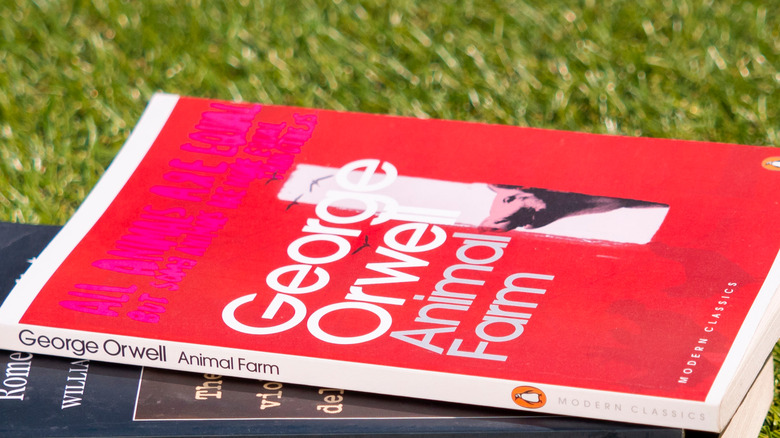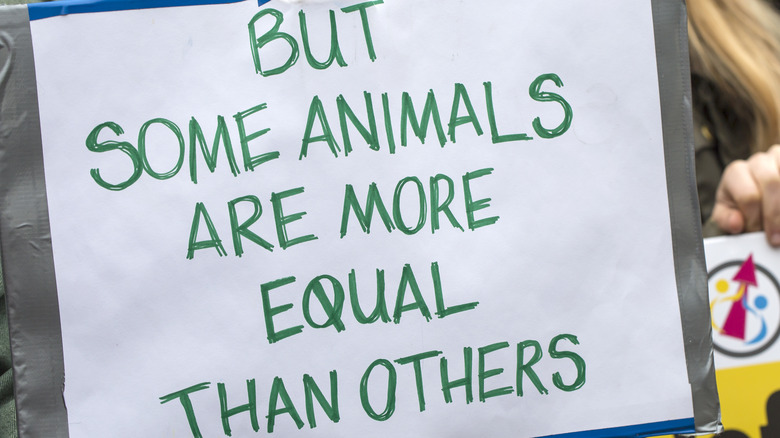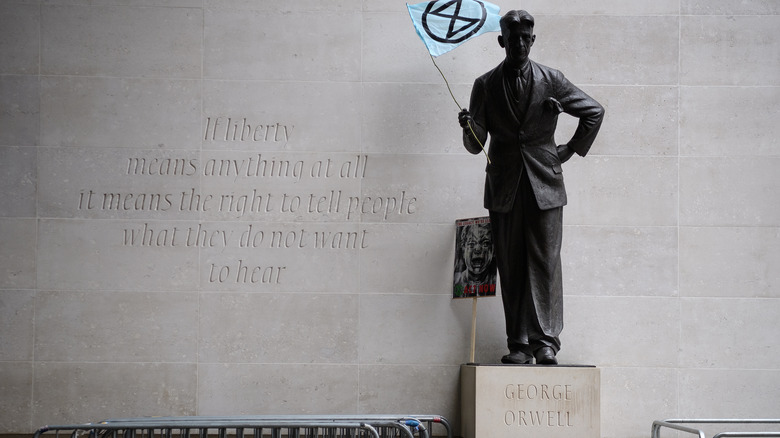The Real Reason Animal Farm Became A Banned Book
If you've never read "Animal Farm" by George Orwell, you might think it's something similar to "Charlotte's Web" — a delightful story about animals living happily on a farm. But if you know anything about its writer, well, then you might hazard a guess that it's far from a fairytale.
Published in 1945, "Animal Farm" is a novel about a group of animals on a farm that decide to rebel against the farmer, Mr. Jones, in the hopes of creating a society where all the animals are seen as equal and are free. In their attempt to create this society, a pig named Napoleon overthrows their attempt and instates a dictatorship in which he is the dictator.
There are lots of other moving parts, but let's not give away the ending. Orwell was inspired by the Russian Revolution of 1917 and the Stalinism that followed (via CliffsNotes). While Orwell described the book as satire, the politics at play in which the men and pigs are categorized as being the same in their thirst for power — ultimately an allegory for Stalinism — didn't bode well with high schools across the United States (via Insider).
But unlike other books that have been challenged or actually banned, the opposition to "Animal Farm" wasn't about profanity or blasphemy. Instead, it was about politics.
Some people disagree with the politics of Animal Farm
In 1982, a school district in Jackson County, Florida challenged "Animal Farm" claiming that it was "pro-communist." Although they did complain that there was "explicit sexual matter" in it as well, it was the alleged advocating for communism that was the biggest concern (via the American Library Association).
Since its publication, "Animal Farm" constantly finds itself in hot water as it's far too often dubbed communist propaganda — clearly by people who don't understand the art of satire.
The fear of spreading communist ideology throughout the country was so deep and so far-reaching that the U.S. Central Intelligence Agency (CIA) actually considered the book a "threat to national security." So much so that in 1954, just four years after Orwell's death, the CIA "covertly" bought the film rights to the novel. They then commissioned and financed an altered version of the film, an animated version, changing many key moments in the plot as well as the ending. The CIA's reason for this was to "combat the culture of communism" (via Library CMU).
It should be noted that Orwell was not a communist, nor was "Animal Farm" communist propaganda. On the contrary, Orwell was a Democratic socialist, writing in 1946, "Every line of serious work that I have written since 1936 has been written, directly or indirectly, against totalitarianism and for democratic socialism, as I understand it" (via The Orwell Foundation).
Some worried that Animal Farm would incite a revolution
Because accusing someone who wasn't a communist for writing communist propaganda (which was actually satire) wasn't absurd enough, another reason "Animal Farm" has been banned is because of its "seditious call to overthrow organized states" (via Library CMU).
What's important to keep in mind here is that George Orwell was born in British India and moved to England with his family when he was a year old. It was there that he was raised and educated. He spent the majority of his life in Europe, even fighting in the Spanish Civil War, and spent some time in Burma (via The Guardian). When he wasn't traveling or fighting in wars that he didn't have to, but did so because he was against fascism and totalitarianism, he was writing. So basically, he was too busy to put out a call, even via a novel, to overthrow anything. Oh, and did we mention "Animal Farm" is satire enough yet, or should we do it one more time for fun? "Animal Farm" is satire.
There's no denying that George Orwell's works are social commentaries on politics, but if Orwell were to be an advocate for any sort of overthrowing it would have been that of fascism, Stalinism, and totalitarianism. A fact that's missed time and time again.


